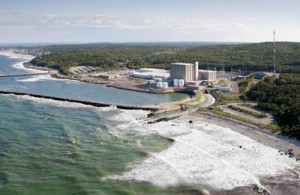
COURTESY PILGRIM NUCLEAR POWER STATION
PLYMOUTH – Senator Ed Markey (D – MA) recently led a subcommittee field hearing in Plymouth where the CEO of Holtec International, the owner of Pilgrim Nuclear Power Station, said the company would not dump one million gallons of radioactive water into Cape Cod Bay.
Dr. Kris Singh, Holtec’s President and CEO, virtually attended the hearing on decommissioning nuclear power plants and committed to not discharging any contaminated water into the bay, with some stipulations.
“We will not discharge any water in the Cape Cod Bay unless we have major stakeholder concurrence. We will not do that. I also said that will mean that the dismantling of the facility may be delayed,” Singh said.
At another point in the hearing, Singh agreed to Markey’s plan to allow the Woods Hole Oceanographic Institution (WHOI) to test the wastewater to determine if it was contaminated and what effect it would have on wildlife in Cape Cod Bay.
Singh said Holtec wouldn’t dump water into the bay if WHOI found the water to be contaminated, but he also said he hoped stakeholders would reconsider if WHOI discovered the radioactive water was not harmful.
At another point in the hearing, Congressman Bill Keating (D – MA) highlighted what he claimed is Holtec’s lack of transparency, citing a conversation he had with officials from the Nuclear Regulatory Commission (NRC) in late 2021 where they stated Holtec had told the commission they were planning on dumping the water into the bay in October 2022, after the company had made public claims stating they had no such plans.
Plymouth and Barnstable State Senator Susan Moran listed several public concerns since ownership of the plant transferred to Holtec in 2019 including funding issues, proper oversight of decommissioning, and safety issues related to dry cask storage units.
The hearing on May 6 came during a period of public comment on a proposed NRC rule to change regulations for nuclear power plants that are shifting from operations to decommissioning, a rule Senator Markey said needs improvements.
“Instead of simply approving this rule which would allow the NRC and plant operators to cut corners on safety and limit public engagement at the expense of the communities near nuclear plants, I hope the NRC takes this opportunity to improve the rule,” Markey said.
“By putting a stronger rule in place, the NRC can ensure that communities have a seat at the table when it comes to the decommissioning process,” Markey added.
By Brian Engles, CapeCod.com NewsCenter
























